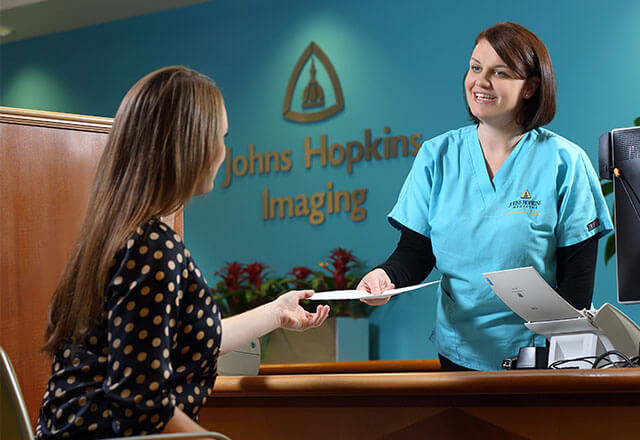Schedule an Appointment
Request An Appointment
Schedule by phone
New and existing patients: 443-997-7237

Scheduling Information

Request a Radiology Appointment
To schedule an exam with Johns Hopkins Medical Imaging, you can call 443-997-7237 or log into MyChart to schedule mammograms, ultrasounds, x-rays, CT, and DEXA exams.
If calling, our scheduling center is open Monday-Friday from 7:30am – 6:00pm and on Saturdays from 8:00am to 12:00pm. The staff will help guide you to the best location for your exam and tell you about any required exam prep necessary. If you have an MRI or PET/CT exam, please send your order in ahead of time by fax (443-451-6986) or email a photo of your order to [email protected].
If you need a MyChart account, complete an online form to sign-up. Once you’re logged in, you can select a date, time, and location that is most convenient for you.
Schedule Your Appointment Online | Learn more about MyChart
Request an Interventional Radiology procedure
Please call 410-502-6611 to request a procedure. Patients will be scheduled through the Johns Hopkins Interventional Radiology Center to coordinate their care. This is the same IR Center coordinating IR patients across Johns Hopkins Medicine. The IR Center determines which patients are eligible for treatment at Green Spring Station. The IR Center is open weekdays from 8 a.m. – 5 p.m.
Learn more about Interventional Radiology
What to Bring to Your Appointment
Patients should bring the following items to their appointment:
- Your picture ID and all insurance cards.
- If you arrive without your necessary authorization and/or referral, you will be expected to pay for your visit prior to receiving services or opt to reschedule your appointment.
- Your HMO/MCO/POS referral form from your primary care physician. The referral should authorize your office visit, procedures and lab work.
- Worker's Compensation cases MUST bring authorization from your claims adjustor.
- Complete name, address, phone number and fax number for your referring physician.
- When appropriate, please bring with your medicine lists copies of any medical notes, lab results, biopsies, X-ray results, etc.
- Children are not allowed in the exam rooms. Children under 12 must remain in the waiting room with appropriate adult supervision during your scan.
For Annual Screening Exams
For annual screening mammograms, you do not need a physician referral form. You will need to provide our staff with the name of the physician who you want to receive your mammography report.
If a follow-up breast imaging exam is necessary, you will need your physician to complete a referral form.
Recent Lab Results for MRI or CT Exams Using Contrast
A blood test measuring creatinine levels is performed in advance of a MRI or CT exam using contrast to evaluate kidney function. This is to screen for potential pre-existing renal insufficiency in patients at high risk for contrast-induced nephropathy. Risk factors will be determined by the radiologist but include:
- Aged 60 or older
- History of renal disease, renal transplant, total nephrectomy or sickle cell crisis
- Diabetes mellitus
- Liver disease
- Recent surgery
- Acute deep vein thrombosis
- Previous allergic reaction to MRI or CT exam using gadolinium contrast
If you have any of these risk factors, you must have a blood test examining your kidney function within the last 30 days. You may either fax this to the office in advance or bring a copy with you to your radiology appointment.
If you do not have recent lab work, you might be eligible to receive the blood test on site when you arrive for your appointment.
Additional Information
Exams Using Contrast
In order to improve visibility of structures and organs inside the body, your physician may order an MRI, CT or X-ray exam that uses a contrast material.
Different types of contrast materials, such as gadolinium, iodine or barium sulfate, are used for different exams. Depending on the exam, the contrast may be inserted through an IV or given by mouth.
Iodine Allergy
Please let the office know when you schedule the exam if you have an allergy to iodine. Your doctor may prescribe medications to take in advance of the exam.

